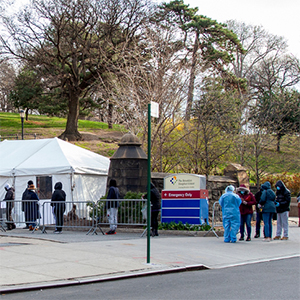Free Resources for Emergency Health Clinics

Project Leads: Jeffrey W. Herrmann
Department of Mechanical Engineering, Institute for Systems Research
As federal, state and local officials scramble to set up emergency medical clinics to deal with the COVID-19 pandemic, the University of Maryland is offering free software tools and other resources to help model and design these clinics for more efficient and effective processing under high demand.
The helpful resources are the product of research conducted from 2005–2013 by Professor Jeffrey W. Herrmann (Mechanical Engineering/Institute for Systems Research), an operations research expert who worked extensively with the U.S. Centers for Disease Control and Prevention (CDC); the National Association of County and City Health Officials (NACCHO), and public health officials from the Montgomery County, Md., government.
Specifically, Herrmann and his colleagues created mathematical and simulation models of mass dispensing and vaccination clinics (also known as points of dispensing or PODs). They also developed decision support tools to help emergency preparedness planners design clinics that have enough capacity to serve residents quickly while avoiding unnecessary congestion.
The clinic planning software—available at no charge—includes:
- Clinic Planning Model Generator, which generates a Microsoft Excel workbook for point of dispensing (POD) planning
- Clinic Surge Planning Model, specifically designed for short-duration, high-volume clinics that anticipate a surge of patients when the clinic opens
- Alternative Care Site Planning Model, which helps public health officials evaluate the resources required to staff and equip alternative care sites in multiple scenarios
- Vaccine Allocation Model, which determines how many people in various target groups can receive treatment if a limited number of vaccinations is available
Although originally designed for earlier scenarios such as the H1N1 flu, the principles behind the models and support tools are applicable to the emergency clinics being set up to test and triage patients in the COVID-19 pandemic.
The Institute for Systems Research within the A. James Clark School of Engineering has created an online resource that offers Dr. Herrmann’s free software tools and summarizes his research. In addition to the downloadable tools, it includes:
- Links to Dr. Herrmann’s publications and presentations
- Video and audio links of Dr. Herrmann explaining the research project
- Links to public health preparedness models from various other sources, including the U.S. Centers for Disease Control and Prevention
Top